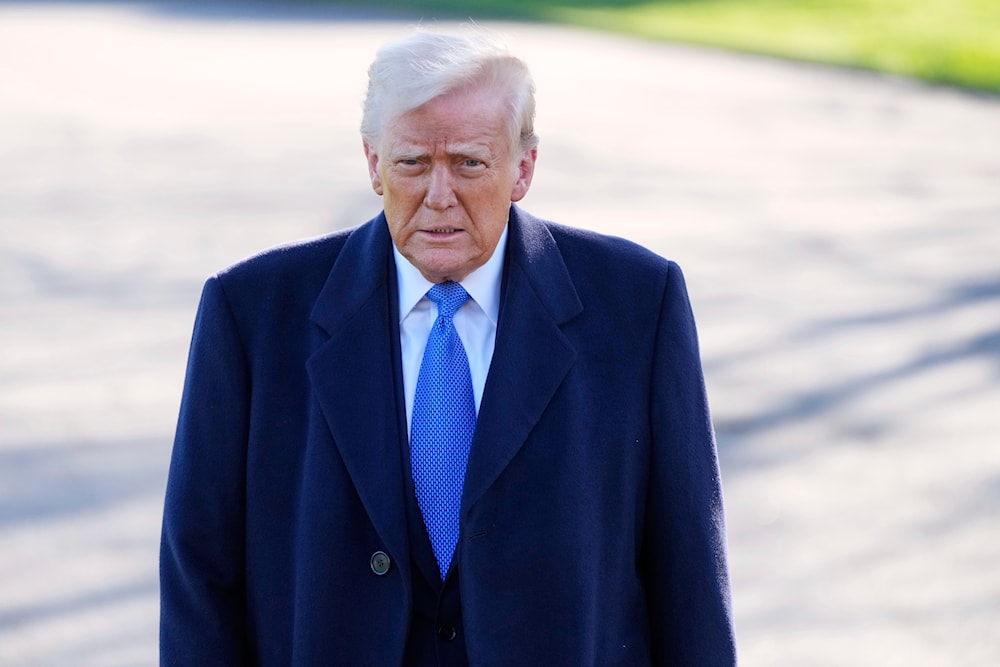Voice of America journalists sue Trump over network shutdown
The VOA shutdown comes amid Trump's crackdown on news outlets critical of him in the US, which he branded "illegal" and "corrupt".
-

President Donald Trump speaks with reporters before departing on Marine One en route to New Jersey, on Friday, March 21, 2025, in Washington (AP)
Voice of America (VOA) journalists have sued US President Donald Trump's administration and senior advisor Kari Lake over the sudden closure of the US-funded network.
The lawsuit, filed in the Manhattan federal court on Friday, seeks the reinstatement of more than 900 full-time employees and 550 contractors placed on indefinite leave, according to National Public Radio (NPR), under the grounds that the shutdown violates the First Amendment and congressional authority.
Among the plaintiffs are former VOA White House Bureau Chief Patsy Widakuswara and Press Freedom Editor Jessica Jerreat, while Kathryn Neeper, a senior official at the US Agency for Global Media (USAGM), has also filed a lawsuit.
Kari Lake, who was appointed by Trump to oversee the US Agency for Global Media (USAGM) defended Trump's decision, saying "Waste, fraud, and abuse run rampant in this agency and American taxpayers shouldn’t have to fund it."
"Tragically, Kari Lake lives in the MAGA fantasy world, but she makes decisions that have real-world consequences for hundreds of journalists," lead attorney for the plaintiffs David Seide stated, condemning the decision to close down the American network.
For some plaintiffs, the shutdown has had severe consequences, as two foreign national VOA journalists face visa expirations on March 31.
The US President signed an executive order on March 16, ordering the dismantling of the Voice of America network, accusing it of being "anti-Trump" and "radical", while a White House statement said Trump's order would "ensure taxpayers are no longer on the hook for radical propaganda."
Mike Abramowitz, the director of VOA, stated that he and nearly all of his 1,300-member staff had been placed on paid leave, adding that the network disables VOA from its "vital mission... especially critical today, when America's adversaries, like Iran, China, and Russia, are sinking billions of dollars into creating false narratives to discredit the United States".
This is the latest measure in Trump's crackdown on media outlets that oppose him, having previously banned journalists from entering the Oval Office and branding media critical of him as "illegal" and "corrupt".
Trump calls media outlets that criticize him "illegal'
On March 13, US President Donald Trump branded news outlets that cover him critically as "illegal" and "corrupt" during a speech.
Speaking at the Department of Justice, Trump said CNN, MSNBC, and other unspecified media outlets "literally write 97.6 percent bad about me," adding, "It has to stop. It has to be illegal."
Trump described those media outlets as "political arms of the Democrat party. And in my opinion, they're really corrupt and they're illegal. What they do is illegal," emphasizing that the news outlets are "influencing judges and it's really changing law, and it just cannot be legal. I don't believe it's legal. And they do it in total coordination with each other."
The US president has repeatedly attacked the media since his first election to the presidency in 2016, calling journalists and media outlets he disapproves of "fake news" and "enemies of the people," while his current presidency is marked by targeting mainstream media outlets with restrictions.
White House bans media outlets from meeting
An Associated Press photographer and journalists from Reuters, HuffPost, and the German newspaper Der Tagesspiegel were denied entry to Trump’s first cabinet meeting on February 27, while TV crews from ABC and Newsmax, along with correspondents from Axios, The Blaze, Bloomberg News, and NPR, were allowed to cover the event.
In response, the three wire services that have traditionally held permanent spots in the White House press pool—AP, Bloomberg, and Reuters—stated on February 27, emphasizing their longstanding role in providing accurate, fair, and timely coverage of the presidency to a diverse audience across the US and worldwide.
"Much of the White House coverage people see in their local news outlets, wherever they are in the world, comes from the wires," the organizations noted.
"It is essential in a democracy for the public to have access to news about their government from an independent, free press," the statement added.
Meanwhile, HuffPost criticized the White House’s decision, calling it a violation of the First Amendment’s guarantee of press freedom.
On February 25, the White House Correspondents’ Association (WHCA) also issued a statement opposing the new policy.
The move comes after the Trump administration barred the Associated Press from the press pool for refusing to adopt the name "Gulf of America"—a term Trump assigned to the Gulf of Mexico—or update its widely used stylebook accordingly.
AP, one of the world’s oldest news agencies, in turn, filed a lawsuit against three senior White House officials, accusing them of restricting press access in retaliation for its editorial decisions.
The complaint, submitted Friday to the US District Court in Washington, D.C., alleges that AP journalists were barred from covering presidential events at the White House and Trump’s Mar-a-Lago residence and from traveling aboard Air Force One.
"The press and all people in the United States have the right to choose their own words and not be retaliated against by the government," AP stated in its lawsuit, which names White House Chief of Staff Susan Wiles, Deputy Chief of Staff Taylor Budowich, and Press Secretary Karoline Leavitt as defendants.

 5 Min Read
5 Min Read








